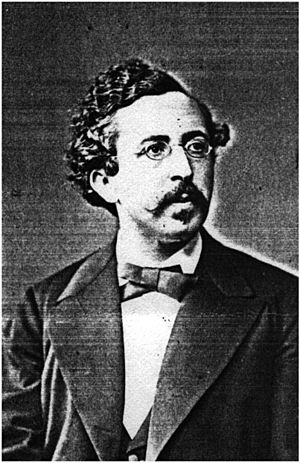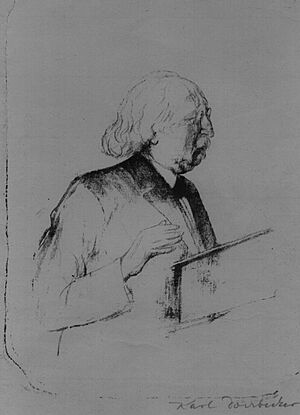Hermann Cohen facts for kids
Quick facts for kids
Hermann Cohen
|
|
|---|---|
 |
|
| Born | 4 July 1842 Coswig, Anhalt, Germany
|
| Died | 4 April 1918 (aged 75) |
| Nationality | German |
| Education | Jewish Theological Seminary of Breslau University of Breslau University of Berlin University of Halle |
| Era | 19th-century philosophy |
| Region | Western philosophy |
| School | Neo-Kantianism (Marburg School) |
| Institutions | University of Marburg |
| Thesis | Die Systematischen Begriffe in Kants Vorkritischen Schriften Nach Ihrem Verhältniss Zum Kritischen Idealismus (The Systematic Terms in Kant's Pre-critical Writings According to Their Relationship to Critical Idealism) (1873) |
| Doctoral students | Paul Natorp |
| Other notable students | Ernst Cassirer Nicolai Hartmann Franz Rosenzweig |
|
Main interests
|
Ethics |
|
Influences
|
|
|
Influenced
|
|
Hermann Cohen (born July 4, 1842 – died April 4, 1918) was an important German Jewish philosopher. He was one of the main thinkers behind the Marburg school of Neo-Kantianism. This was a way of thinking that built on the ideas of the famous philosopher Immanuel Kant. Many people consider Cohen to be "probably the most important Jewish philosopher of the nineteenth century."
Contents
Hermann Cohen's Life Story
Cohen was born in Coswig, Anhalt, which is in Germany. He started studying philosophy at a young age. Soon, he became well-known for his deep understanding of Immanuel Kant's ideas.
Education and Early Career
Hermann Cohen went to school at the Gymnasium in Dessau. He also studied at the Jewish Theological Seminary of Breslau. Later, he attended several universities, including Breslau, Berlin, and Halle.
In 1873, he became a Privatdozent at the University of Marburg. This means he was a private lecturer who could teach at the university. He became a full professor there in 1876.
Contributions to Jewish Studies
Cohen helped start the "Gesellschaft zur Förderung der Wissenschaft des Judenthums" (Society for the Promotion of the Science of Judaism). This group held its first meeting in Berlin in 1902. It aimed to encourage the study of Jewish culture and history.
He also worked on publishing the philosophical writings of Friedrich Albert Lange. Cohen wrote introductions and notes for Lange's important work, Geschichte des Materialismus.
Hermann Cohen's Philosophical Ideas
Hermann Cohen wrote many books and essays about philosophy. His early works focused on explaining the ideas of Immanuel Kant.
Understanding Kant's Philosophy
Cohen wrote three important books about Kant's philosophy:
- Kant's Theory of Experience
- Kant's Foundations of Ethics (about moral rules)
- Kant's Foundations of Aesthetics (about beauty and art)
Cohen's Own Philosophy
Later, Cohen started publishing his own system of philosophy. He planned four volumes, but only finished three:
- Logik der reinen Erkenntnis (Logic of Pure Knowledge) in 1902
- Ethik des reinen Willens (Ethics of Pure Will) in 1904
- Ästhetik des reinen Gefühls (Aesthetics of Pure Feeling) in 1912
He planned a fourth book on psychology, but he never wrote it.
Jewish Philosophy and Views
Cohen also wrote many works specifically about Judaism. Some of his most famous Jewish writings include:
- Religion der Vernunft aus den Quellen des Judentums (Religion of Reason out of the Sources of Judaism)
- Deutschtum und Judentum (German Identity and Jewish Identity)
- Die Naechstenliebe im Talmud (Love of Neighbor in the Talmud)
- Die Ethik des Maimonides (The Ethics of Maimonides)
His Jewish writings were later collected and published in three volumes called Jüdische Schriften.
Views on Zionism
Hermann Cohen was a strong critic of Zionism. Zionism is the idea of creating a Jewish state. Cohen believed that Judaism had a spiritual and moral mission that was much bigger than just national goals. He thought that creating a Jewish state would make Jews "return to History," which he saw as going against Judaism's special, timeless role.
Despite his views, there is a Hermann Cohen Street in Tel Aviv, Israel.
Later Life and Legacy
Hermann Cohen is buried in the Weißensee Cemetery in Berlin, Germany. His ideas continue to be studied by philosophers today.
See also
 In Spanish: Hermann Cohen para niños
In Spanish: Hermann Cohen para niños
 | Janet Taylor Pickett |
 | Synthia Saint James |
 | Howardena Pindell |
 | Faith Ringgold |


